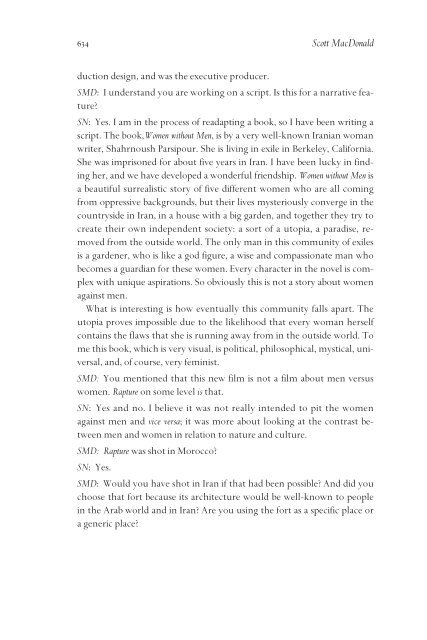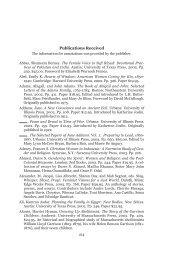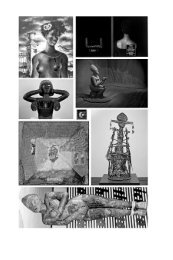An Interview with Shirin Neshat - Feminist Studies
An Interview with Shirin Neshat - Feminist Studies
An Interview with Shirin Neshat - Feminist Studies
You also want an ePaper? Increase the reach of your titles
YUMPU automatically turns print PDFs into web optimized ePapers that Google loves.
634 Scott MacDonald<br />
duction design, and was the executive producer.<br />
SMD: I understand you are working on a script. Is this for a narrative feature?<br />
SN: Yes. I am in the process of readapting a book, so I have been writing a<br />
script. The book,Women <strong>with</strong>out Men, is by a very well-known Iranian woman<br />
writer, Shahrnoush Parsipour. She is living in exile in Berkeley, California.<br />
She was imprisoned for about five years in Iran. I have been lucky in finding<br />
her, and we have developed a wonderful friendship. Women <strong>with</strong>out Men is<br />
a beautiful surrealistic story of five different women who are all coming<br />
from oppressive backgrounds, but their lives mysteriously converge in the<br />
countryside in Iran, in a house <strong>with</strong> a big garden, and together they try to<br />
create their own independent society: a sort of a utopia, a paradise, removed<br />
from the outside world. The only man in this community of exiles<br />
is a gardener, who is like a god figure, a wise and compassionate man who<br />
becomes a guardian for these women. Every character in the novel is complex<br />
<strong>with</strong> unique aspirations. So obviously this is not a story about women<br />
against men.<br />
What is interesting is how eventually this community falls apart. The<br />
utopia proves impossible due to the likelihood that every woman herself<br />
contains the flaws that she is running away from in the outside world. To<br />
me this book, which is very visual, is political, philosophical, mystical, universal,<br />
and, of course, very feminist.<br />
SMD: You mentioned that this new film is not a film about men versus<br />
women. Rapture on some level is that.<br />
SN: Yes and no. I believe it was not really intended to pit the women<br />
against men and vice versa; it was more about looking at the contrast between<br />
men and women in relation to nature and culture.<br />
SMD: Rapture was shot in Morocco?<br />
SN: Yes.<br />
SMD: Would you have shot in Iran if that had been possible? <strong>An</strong>d did you<br />
choose that fort because its architecture would be well-known to people<br />
in the Arab world and in Iran? Are you using the fort as a specific place or<br />
a generic place?




